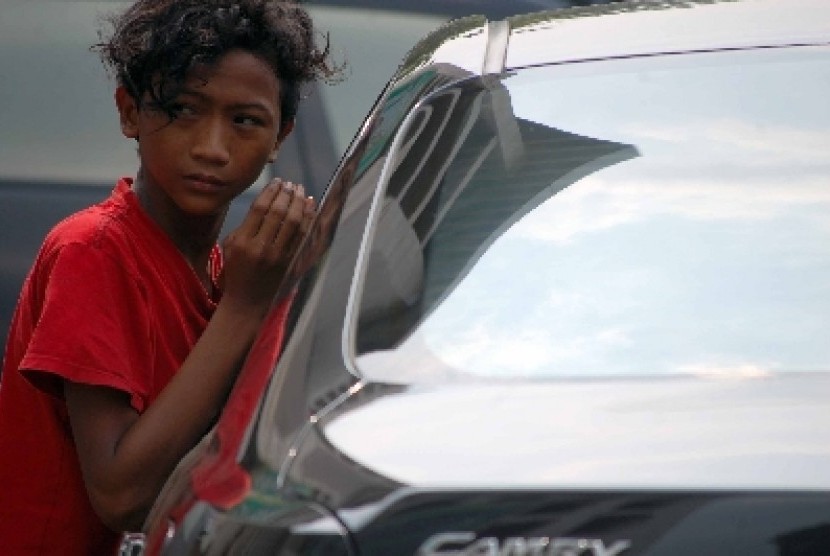REPUBLIKA.CO.ID, By : Otjih. S*)
President Joko Widodo has said that the poverty level has increased on account of slow economic growth and food-price increases. "I want all policies, all programs in poverty and inequality alleviation to be implemented in an integrated way among Bank Indonesia [BI], the Financial Services Authority [OJK] and the State Logistics Agency [Bulog]," Jokowi said.
He was speaking in a limited Cabinet meeting at the State Palace in Jakarta on Wednesday that specifically discussed poverty alleviation and economic inequality as part of the government’s commitment to addressing poverty and the inequality gap both among Indonesians and regions.
Based on BPS data in September 2015, the number of poor people reached 28.51 million, 11.13 percent of the population. The portion of poor people in urban areas reached 8.2 percent of the total population, while the percentage of poor people in the rural areas was higher at 14.09 percent of the total population.
As a result, the BPS says, the gini coefficient ratio, which reflects the gap between the rich and the poor, reached 0.41 in September 2015, in which the larger gap was found in cities, 0.43. Meanwhile, the gini ratio in the villages was 0.33.
Jokowi further said unstable food prices would easily eliminate all the positive effects of the programs focused on poverty alleviation. "It must truly our concern," he asserted.
Jokowi further said that the distribution of social assistance cards, such as the Indonesia Health Cards (KIS), Indonesia Smart Card (KIP), and the Prosperous Family Card (KKS), should be completed in April.
The President also said that another pro-people program called the Village Fund program should be beneficial for people in villages nationwide. He called for more labor-intensive projects to improve the purchasing power of people in rural areas. In the meeting, President Jokowi praised increases in the absorption of the public business credit loan (KUR) program, in which its interest rate now stood at 9 percent.
In a press conference after the meeting, Coordinating Economic Minister Darmin Nasution said the government agreed to establish an integrated pilot project on poverty alleviation in Brebes, Central Java, involving several ministries and institutions. “It should start by improving land certification and KUR disbursement, and adopting mobile banking and e-money, with support from BI and the OJK," he said. Darmin said the State-Owned Enterprises Ministry was ready to instruct a state firm to assist export and import activities in Brebes, a shallot producing area. "In the future, we don’t have to export the excess amount of shallots anymore because we can process and store them in the country," he said. Results of the pilot project would be implemented in handicraft, agriculture and tourism centers.
The Exit Strategy
The sources of slow economic growth has driven by several factors. From global factors such as the slump in of Chinese economic growth, global oil prices smashed, currency war, current account deficit, and never ending conflict at “Silk road” (Suriah, Iraq, and some countries in Africa continent). Meanwhile, from internal factors such as increasing the level poverty, food-prices increases is triggered by food smuggling and cartel activities,inequality alleviation, the rampant of black market and underground economy”, politic and economic progress etc.
I think the government policy has implemented the Indonesia Health Cards (KIS), Indonesia Smart Card (KIP), the Prosperous Family Card (KKS) and the public business credit loan (KUR) program are a proper policy to solving inequality alleviation, decreasing poverty level and to curtail a economic barriers for small and medium enterprises in some regions in Indonesia. KUR program is showed that the recent government has realized that small and medium enterprises has been roled strong enough as “national economic bone or skeleton” during global economic recession previously.
Whereas, the Indonesia Health Cards (KIS), Indonesia Smart Card (KIP), the Prosperous Family Card (KKS) have indicated that the government has concern on public education, public health and public prosperity. The government has argument that our society problem should be finished because if its always happen might be pushed social and security vulnerability.
The government has realized that Indonesia is in the middle of a global competition that calls for speed in economic activity, because only countries that speed up their development can win the competition. President Jokowi always asserted that government hopes our country to win the competition, and our cities and districts to win the competition. To boost national economic progress, connectivity among cities throughout the country, from Sabang in Aceh to Merauke in Papua, will be the driver of Indonesia's development.
One of exit strategy to solve poverty and inequality-alleviation, local administrations to boost tourism promotion by cooperating with other provinces and the Tourism Ministry. To be remember that well-managed facilities and destinations will be useless without promotions.
Another exit strategy must do by central government is stoped illegal economic activities such as black market and underground economy because its still occur and proliferation of the crime of illegal economic distortion, subsidized fertilizer, fuel smuggling of diesel and gasoline, rice plant seedlings forgery or misuse of various government economic assistance in addition due to profit economically motive (profit taking), monopolized the distribution and sales.
In addition, rampant economic activity illegal going on in some areas, especially areas that have land borders and border areas vast sea, can also cause harm to the local economy and the national economy, is also the possibility of having an agenda setting to discredit the government, which raises image and public opinion that the government has not been able to face economic cartel octopus, has not been able to dismantle criminal economic networks and uncapable to reduce the economic losses due to the country's economic crimes.
Furthermore, illegal economic activities are also potential conflict between communities, as well as damage the environment and disrupt the stability of national economic defense (national economic resilience) in the next few years.
*) Researcher, earned bachelor degree in economic study at Udayana University, Bali. Residing in East Jakarta.



